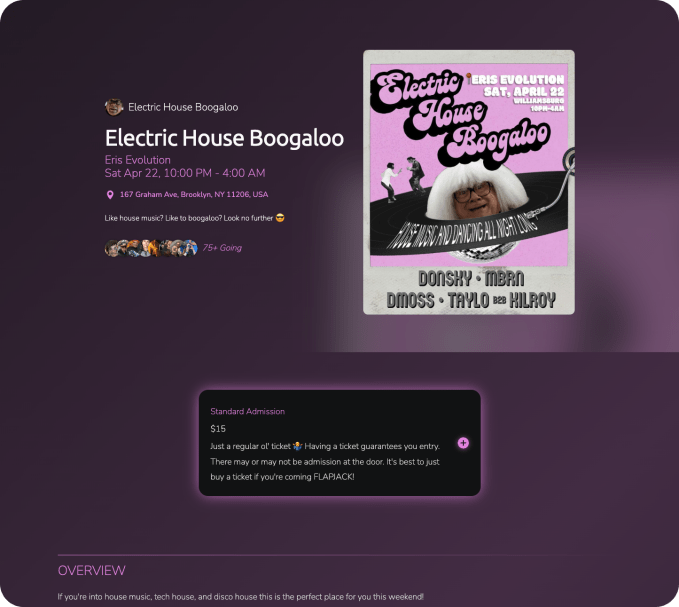POSH is an event management and ticketing platform for all users to host events large or small, regardless of if you’re an event organizer, promoter, or if you just want to charge your friends a cover for drinking all the expensive alcohol at your birthday party.
POSH announced its public launch Thursday after being in beta since October 2020.
Alongside the launch, the company also announced its $5 million seed round, co-led by Companyon Ventures and EPIC Ventures, with participation from Day One Ventures, Pareto Holdings, DoNotPay founder Joshua Browder and others.
“We are thrilled to invest in [POSH co-founders Avante Price and Eli Taylor-Lemire] as they continue to redefine the live events management experience for organizers and attendees,” said Tom Lazay, co-founder and general partner of Companyon Ventures, in a statement.
The funding will go towards expanding its team, working on new features and updating its mobile app.
Currently, POSH has an iOS app for event curators only. The app will launch on Android devices next month. In June, the POSH is adding updates that will focus on features for the attendee/eventgoer side of the platform, including an explore tab and social elements.
POSH wants to be a “Shopify for all events,” said Price (22) and Taylor-Lemire (22) when speaking with TechCrunch. The platform is designed to provide an all-in-one, self-serve platform for organizers to create white-labeled event pages, send out unlimited text blasts and emails to eventgoers, and access custom payment plans, community management features and analytics like attendee demographics, tracking link data and more.
Like Shopify, POSH has integrations with third-party apps, including MailChimp, Stripe and Twilio. Additionally, the platform has an API so organizers can list POSH events on third-party marketplaces like EDMTrain. There’s also a webhook feature that gives users real-time updates about transactions.
One differentiator from other event platforms is that POSH users can customize their own “marketplace” of sorts to fit their brand. This will likely be valuable for smaller, independent event organizers who want to scale their businesses.
“If you’re a much bigger brand and you go on Dice, Ticketmaster or Eventbrite, the ticketing platforms’ branding is all over your event page. And your branding is basically not seen at all,” Taylor-Lemire said. “When we go and ask attendees that go out using platforms like Dice or Ticketmaster, ‘Hey, do you know the event production company that put together this event?’ They usually are just like, ‘No I just purchased the tickets on Dice.’”
Taylor-Lemire added that POSH has more “subtle branding” so attendees can focus on the organizers themselves.
The platform offers various tools for users to customize their event page. This includes personalizing the background appearance with accent colors as well as adding a flyer, venue photos, artist line-ups, website code embeds, custom aerial seat maps and more.
Event organizers get a profile where they can promote all their events in one place. There’s a section at the top that lists the total number of events as well as how many eventgoers have attended.
POSH also has options where organizers can approve an attendee before inviting them. In addition, they can request attendees to RSVP with their social media info—whether that be a LinkedIn, Instagram or Twitter account. For extra security, they have the option to lock the event with a password.
Another notable feature is POSH’s proprietary “Kickback” tool. The attendee-to-affiliate conversion tool feature allows guests to invite their friends to events and receive a commission on ticket sales. The affiliate receives a link that they then share. They can connect their debit card to get instant cash back. The organizer sets the reward percentage. For example, affiliates could get 20% of the ticket order value.
The feature is a sure way to incentivize more ticket sales, however, POSH also wants to show attendees that they can become event organizers too.
“If you’re a micro-influencer… you get that soft introduction to bringing people to an event. And then you can use our tools to actually start your own event brand. That’s kind of the goal with this tool,” Taylor-Lemire said.
“Attendees usually don’t just go from going to a bunch of events to throwing a massive party. There’s some intermediary steps like you become a promoter, or you work as a photo/video person for a company or a DJ– you can monetize your social influence,” he added.
Right now, attendees can only see the Kickback offer if they’ve received a link to the event. Eventually, POSH plans to include the offer on the explore tab for everyone to see.
POSH allows attendees to chat and interact with one another before and after the event via the platform. Party RSVP website Partiful has a similar feature that lets users comment directly on the event page.
However, POSH is also considering adding a monetization feature where attendees can anonymously “like” names on the guest list, Price explained. The attendee would have to pay a fee in order to see who liked them. The concept is interesting, yet we’re not sure if many people would want to pay for that type of feature.
Notably, POSH claims it has over half a million users and $30 million in processed tickets. While the company declined to share valuation or revenue run rate, it says it recently achieved profitability.
“We’re very excited for the launch and having our story told as young African American founders. There were very few role models for us when we were getting into space… to get to where we are today was an uphill battle,” Taylor-Lemire said. “And so, we want to inspire any other young founders out there like us who were passionate about building but really didn’t know how to go about the venture or tech side of things that it is possible…You can make things happen.”
POSH launched in 2019 as an events company after Price and Taylor-Lemire became frustrated working as freelancers in NYC nightclubs. Price was the DJ and Taylor-Lemire handled the photography and video content.
“People were paying us late and giving us false promises and all these other things,” Price said. “The biggest thing was a lot of these brands were run by older people who didn’t really understand what the college kids wanted, whether it’s the vibe, etc.
Price and Taylor-Lemire initially created POSH to host events for college students and young professionals.
“You would apply with your LinkedIn or Twitter, [tell us] what value you bring to the community, we accept, you’d come to our weekly events. It’s still a party. It wasn’t a networking experience by any means. But it was a little bit more classy, and that’s kind of where the name POSH came from,” Price added.
The company soon evolved into the management and ticketing platform it is today.
While Price and Taylor-Lemire are only 22 years old, respectively, the two NYU dropouts have experience in both the tech world and the entertainment space.
Price had quite an early start in entertainment, to say the least. He was five years old when his father, a local DJ, taught him how to DJ on vinyl.
Admittedly at first, we found it hard to believe that a child would know how to mix and scratch a turntable. During the TechCrunch interview, Price showed us a YouTube video of him doing just that.
As a high schooler, he started his first startup called ChoreBug, a TaskRabbit-like service where users could hire local high schoolers in the area to do everyday tasks.
Meanwhile, Taylor-Lemire was fascinated with YouTube growing up and eventually found his way into music video production, shooting for local rappers in his area.
In high school, he co-founded a startup called Stumped, a school community-building app.
He later started a freelance photo agency, producing content for fashion magazines and working with Sony and ROC Nation-signed artists. Taylor-Lemire also created Music Video Express, a service where people could book videographers in the area.
Updated 4/27/23 at 9:18 a.m. ET with the removal of sentence, “Users can host events with a maximum of 10,000 guests.” There is no maximum number of guests, event organizers can host as many attendees as they want.
Event platform POSH wants to democratize event planning by Lauren Forristal originally published on TechCrunch









